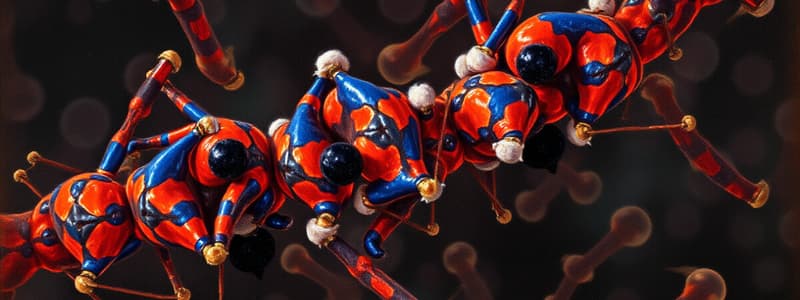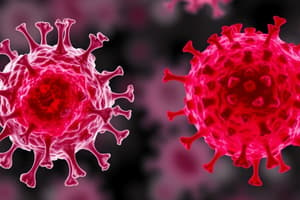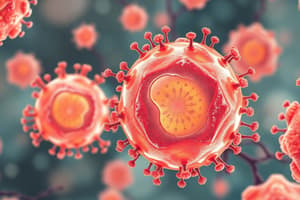Podcast
Questions and Answers
What is the primary role of MHC molecules in the immune response?
What is the primary role of MHC molecules in the immune response?
- To produce antibodies against antigens
- To directly destroy pathogens
- To activate B cells in the absence of T cells
- To present antigen fragments to T cells (correct)
Which of the following classes of MHC molecules is responsible for presenting antigens derived from intracellular sources?
Which of the following classes of MHC molecules is responsible for presenting antigens derived from intracellular sources?
- MHC class II
- MHC class IV
- MHC class I (correct)
- MHC class III
What type of cells are considered professional antigen-presenting cells (APCs)?
What type of cells are considered professional antigen-presenting cells (APCs)?
- B cells, macrophages, and dendritic cells (correct)
- Natural killer cells
- Erythrocytes and platelets
- Neutrophils and basophils
What is the significance of cross-presentation in the immune system?
What is the significance of cross-presentation in the immune system?
Which statement best describes the expression of MHC class II molecules?
Which statement best describes the expression of MHC class II molecules?
What is the primary function of Major Histocompatibility Complex (MHC)?
What is the primary function of Major Histocompatibility Complex (MHC)?
Which statement about MHC Class I and Class II molecules is correct?
Which statement about MHC Class I and Class II molecules is correct?
Which of the following cells primarily expresses MHC Class II molecules?
Which of the following cells primarily expresses MHC Class II molecules?
What is a characteristic feature of Human Leukocyte Antigen (HLA) in terms of its genetic structure?
What is a characteristic feature of Human Leukocyte Antigen (HLA) in terms of its genetic structure?
Which of the following accurately describes MHC Class I molecules?
Which of the following accurately describes MHC Class I molecules?
Study Notes
Antigen Processing and Presentation
- Antigen processing involves capturing and degrading antigens for presentation to T cells via Major Histocompatibility Complex (MHC) molecules.
- T cells require peptide-MHC complexes for recognition, while B cells can bind free antigens directly.
- MHC molecules, encoded by multiple loci, present processed antigen fragments to T cells, pivotal for initiating an immune response.
- MHC class I (HLA class I) is present on all nucleated cells, presenting endogenous peptides to CD8+ T cells.
- MHC class II (HLA class II) is mainly found on professional Antigen Presenting Cells (APCs) like dendritic cells, macrophages, and B cells, presenting exogenous peptides to CD4+ T cells.
Structure and Function of MHC
- MHC class I consists of four domains (α1, α2, α3, and β2-microglobulin) and interacts with CD8+ T cells.
- MHC class II consists of four domains (α1, α2, β1, and β2) and is recognized by CD4+ T cells.
- Human MHC is referred to as Human Leukocyte Antigen (HLA) with two classes: HLA class I and HLA class II, each being polygenic and polymorphic.
Antigen Sources and Presentation Mechanisms
- Endogenous antigens (e.g., viruses, tumors) are modified and presented via MHC class I; they undergo degradation in the cytosol by proteasomes.
- Exogenous antigens (e.g., bacteria) are taken up through endocytosis or phagocytosis, processed in lysosomes, and presented via MHC class II.
- For MHC class I loading, peptides are transported to the endoplasmic reticulum (ER) and bind to MHC class I molecules before transport to the cell surface.
- MHC class II molecules are synthesized in the ER with an invariant chain blocking the peptide groove, replaced by antigen peptides after the chain is cleaved.
MHC Restriction and Immune Response
- T cell recognition is dependent on peptide-MHC complexes; T cell receptors (TCRs) recognize these complexes rather than solitary peptides.
- MHC restriction ensures T cells only respond to self-MHC-displayed peptides, crucial for distinguishing self from non-self.
Clinical Relevance
- MHC compatibility is crucial in organ transplantation; mismatches can lead to rejection.
- Certain MHC genotypes increase the risk of autoimmune diseases such as Type 1 diabetes and rheumatoid arthritis.
- MHC diversity impacts susceptibility to infections and can affect disease outcomes in infections like HIV and malaria.
- Understanding MHC's role in presenting tumor antigens can improve effectiveness in cancer immunotherapy and personalized medicine approaches.
Studying That Suits You
Use AI to generate personalized quizzes and flashcards to suit your learning preferences.
Related Documents
Description
Test your knowledge on the structure and function of MHC class I and II proteins, as well as their role in the immune response. Explore the various sources and types of antigens processed by these molecules, and identify professional antigen presenting cells. This quiz will enhance your understanding of T helper cells and their significance in immune regulation.




